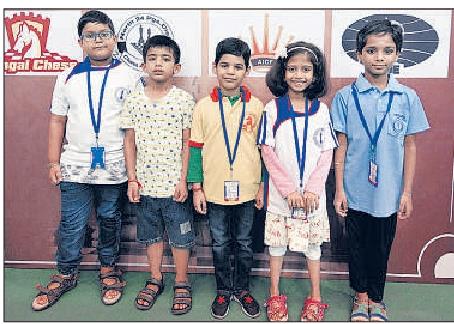Apaar Saxena, 7, of Bangalore made the first right move a year ago when his mother had handed over a smart phone to beat his boredom at the New Delhi airport.
A year later, the first move made on the online chessboard has helped him come third at a national chess meet and qualify for the 2020 world championship. In between, Apaar's interest in the game was nurtured further under a professional coach.
Apaar is not the only one to make an early start on the chequered board. G. Sri. Akhil Prasad, 7, from Vizag would accompany his sister to her chess classes and that sparked off his love for the sport. Akhil is a under-7 national champion and has also qualified for the 2020 world championship.
Like Apaar and Akhil, children from 28 states had turned up with their parents for the six-day 33rd National Under-7 Open and Girls' Chess Championship 2019, which was organised by Global Chess in association with Bengal Chess Association at The Newtown School, starting June 1.
What started as a pastime for many is now a serious sport with these children devoting three to four hours every day to chess, at times even at the cost of studies.
'When Apaar started off, he would play the game on the tab without understanding much. Without much professional coaching he won a few tournaments. That is when we realised that he should be playing more seriously,' said his mother Ruchi Saxena.
For Akhil, evenings are for chess with his coach Ramana Babu guiding him with the moves daily. The training helped Akhil win the tourney that ended on Thursday.
'Akhil moves around and looks at other players' boards once he is finished with his move. He has picked up this habit from Grandmasters, but he risks losing concentration,' his father G. Sridhar, a dentist, said.
While the children are trained under coaches, parents also undergo coaching and counselling tips.
Ambika Harikrishna, paediatrician and mother of Siddhi Rao who came first among girls on Thursday, said her daughter had been playing the game since she was a little over four years. Ambika used to accompany Siddhi to her chess classes to learn the basics of the game and how to write down the moves. 'Whenever she has any doubt, I note it down for her coach to clarify it later,' said Ambika.
More than 300 children, including over 100 girls, took part in the six-day tournament that ended on Thursday. Top six performers, three each in the open (girls and boys) and girls' category, have qualified for the World Cadet Chess Championship of the World Chess Federation.
Those who have qualified for the 2020 world chess championship are Akhil, Risabh Kumar, Apaar, Siddhi, Sannah M and Sreekarthika Velamurugan.
'Starting off young helps as coaches get time to groom them and the players have both the motivation and the time to become world champions,' said Atanu Lahiri, the secretary of Bengal Chess Association and Asia representative of the World Chess Federation's education wing.
But what the association rues is the lack of support from the state government.
'They have funds for local clubs, but not for state or national level chess players,' he said.
Experts feel Bengal players were also losing out because of parental pressure and interference.
'Many players give up after Class VIII because of the pressure of board exams and chess takes a backseat to prioritise academic performance. They don't think of striking a balance between the two,' said Sayan Mukerji, the association vice-president.
The six-day chess tourney had created a buzz in the area.
'We have the intent to promote the game and since we have the space we gave it to them. Availability of guest houses in the area also helped accommodate parents who came from across India,' said Vineet Kansal, CEO of Newtown School.











